
The headquarters of Association of Southeast Asia Nations (ASEAN) in Jalan Sisingamangaraja No.70A, South Jakarta, Indonesia. Photo Credit: Gunawan Kartapranata
This week, leaders from 10 Southeast Asian nations will gather on the Malaysian resort island of Langkawi for the 26th Association of Southeast Asian Nations (ASEAN) Summit. Among the topics to be discussed will be the island reclamation work currently underway by China and the need to press for a binding code of conduct in the disputed South China Sea.
A code of conduct has become more urgent in recent days following spats between Chinese naval vessels and Philippine fishermen. The Philippines has also accused Beijing of flashing powerful lights on a Philippine navy reconnaissance plane, and ordering it to leave territory claimed by China. The actions follow Beijing’s increase in the reclamation work on several islands in the disputed Spratly Island chain, whose hundreds of islands, coral reefs and shoals are claimed by Brunei, China, Malaysia, the Philippines, Taiwan and Vietnam. Concern has risen following the publication of recent satellite images which reveal significant reclamation work on seven islands, which critics believe will be used to build military bases to support naval and air patrols while causing extensive destruction of coral reefs. While admitting to their potential military use, Beijing also claims the structures will be a common good, and help with maritime navigation and disaster relief following extreme weather conditions.
Beijing has since denied the use of a powerful light, but did admit to issuing a radio warning to a Philippine navy aircraft on Sunday, close to Subi Reef, which has been occupied since the 1970s by the Philippines. Chinese Foreign Ministry spokesman Hong Lei justified the action, claiming Philippine planes had “illegally flown over Chinese waters on numerous occasions recently.”
Hong also denied reports earlier this month that the Chinese coast guard fired a water cannon at Filipino fishermen near the Scarborough Shoal, damaging some of their wooden boats and confiscating their catch. Hong added, “We demand that the Philippine side increase its education and control of its fishermen, and cease all behavior that violates China’s sovereignty and rights and interests.” Scarborough Shoal was seized by China from the Philippines in 2012.
While the above actions by China have been irksome but minor, the repercussions are many. ASEAN is now being pressed by Manila for a binding code of conduct in the South China Sea, and the Philippines continues to challenge China’s claims in an international arbitration tribunal challenging China’s claims. Manila and Hanoi are now talking about forming a strategic partnership, to include working together on maritime disputes, holding joint naval exercises and conducting joint scientific studies, all in the South China Sea.
The United States is also increasingly being drawn to the region, with the new U.S. Defense Secretary, Ashton Carter, announcing the next phase in the U.S. “pivot to Asia”, with more sophisticated destroyers, bombers and fighters expected to be deployed to the region. Last week, U.S. Marines conducted their largest combined military exercise in 15 years with the Philippines, and the Obama administration wants to increase the presence of the U.S. military on the Philippine archipelago. The U.S. has requested access to eight Philippine military locations in order to rotate troops, aircraft, and ships involved in joint military training and exercises as part of the pending Enhanced Defense Cooperation Agreement. (The agreement was signed last year between Manila and Washington.) The eight proposed locations are located on the islands of Luzon (4), Cebu (2) and Palawan (2). The U.S. is also seeking to return to its former military bases in Subic and Clark, after the Philippines terminated the agreement in 1992.
This week, as the ASEAN summit progresses, Beijing may seek to calm its nervous Southeast Asian neighbors by limiting any aggressive actions and reaching out through bilateral negotiation. Beijing has long fought to delay the adoption of a code of conduct, hoping to accelerate reclamation activity and create “de facto” control over the region prior to any agreement. ASEAN nations should use this week’s summit to quickly move forward a binding code of conduct – something which they have reluctant to push forward in fear of angering their key trading partner, China. As Philippine Foreign Secretary Albert del Rosario told a meeting of ASEAN foreign ministers on Sunday, “ASEAN should assert its leadership, centrality and solidarity. ASEAN must show the world that it has the resolve to act in the common interest.”
At the ministers’ meeting on Sunday morning, only the Philippines and Vietnam spoke of the South China Sea dispute — according to an ASEAN diplomat, the other states were more concerned about setting up a single time zone. A condemnation of island building and an agreement on a code of conduct should not be held up by distractions or for economic considerations, no less than ASEAN’s credibility as a regional organization is at stake.